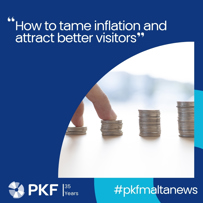How to tame inflation and attract better visitors
Author: George Mangion - Senior Partner at PKF Malta
Published on Business Today: 28th September 2023

Heritage buffs exhort us to promote our historical heritage as an integral component of the brand. Ideally, trained officers are engaged by MTA to inspect and protect areas as models for sustainable tourism, enhancing responsible travel to natural areas which conserves the environment and sustains the well-being of local people.
So, the question remains - are we poised to capitalise on an outstanding recovery this year capitalizing on the phenomenon of “revenge tourism”?
Few doubt that arrivals will reach another record this year as the entire ecosystem is conveniently geared to please the all-inclusive, flowing beer brigade. And few in Malta question the effect of an increase in prices given that the NSO declared that the annual rate of inflation as measured by the Harmonised Index of Consumer Prices remained at a constant of 0.1% last month while the 12-month moving average rate for April stood at a mere 0.4%.
The largest upward impact on annual inflation was measured in the education Index, while the largest downward impact was recorded in the restaurants and hotels Index. On the financial front, a deficit last year of 10.1% is forecast to grow to 12% this year before dropping by half next year to 5.5%.
The balance of payments which in 2019 showed a surplus of about Euro 70m, now the deficit exceeds Euro 1,500m. As can be expected, this resulted from unprecedented costs of fighting the pandemic. State debt will rise another tranche to finish 55.5% of GDP next year. These statistics were not easy reading, especially for the Malta Chamber of SME’s as it warns the government about rising prices on imported items over a range of sectors.
Food prices are pushing inflation up, with the National Statistics Office saying that the annual rate as measured by the retail price index was at 2.08% in August, up from 1.81% in July.
The Malta Chamber of Commerce, Enterprise and Industry believes the inflation index on which the cost-of-living adjustment (COLA) is based is not showing a major spike in local food prices, but a slow increase over time, which, it says, is the “ultimate mix” of a number of issues and challenges that are heavily impacting the price of goods. Extra costs are undeniably incurred by Maltese traders as part of their transport and logistics operations to access overseas markets.
Problems, were attributed to the lack of containers as prices have also soared from around €3,000 to €10,000 (some downwards adjustment is a blessing).
Price movements are attributed to hefty increases in the price of imports from Asia. Production and distribution costs of goods have been pushed higher worldwide by disruptions caused by the pandemic, while oil and commodity prices have surged (oil now in the $90 bracket). This is causing inflation which needs to be factored in when computing the next round of COLA wage adjustment exercise.
Unions cannot ignore their members plight in face of such increases and must at the MCESD meeting (headed by expert Dr Cardona) show their objection to the way minimum wages are adjusted. Importers, badly hit by reduced turnover over the past eight months cannot but adjust upwards the prices unless the market prohibits them, in which case they bear the cost to remain competitive.
Naturally, during deficit periods, governments borrow heavily to pay maturing bonds. At present, cost of borrowing is at a good rate of interest, so it will not ruffle feathers but once inflation creeps in, interest rates will rise. In fact, the 10-year USA Treasury bond rate touches 4.4%. The finance minister promised not to resort to higher taxation (to settle soaring debt) which is understandable not to upset voters.
As can be expected, some economists fear that inflation will return as the pandemic and the heavy financing of furlough schemes will cease. It is obvious that if the global recovery picks up pace this year, the main focus will be on the impact it will have on prices, with observers warning a long period of high inflation will force central banks to wind back the ultra-loose monetary policies.
Starting with the USA economy, we notice the upward pressure on inflation resulting from President Joe Biden’s massive stimulus package passed earlier this year, while he harbours other Keynesian ideas to splurge trillions on infrastructure, not forgetting help for low-income families.
As expected, oil markets have stabilized at higher rates (now touting upwards of 90 dollars). Moving on, we recall how in April, the US witnessed a year-on year inflation growth at 4.2 per cent. This is double the previous level of 2.6 per cent. The core inflation rate now reached the three per cent level.
Eurozone inflation is also likely to trend higher and will possibly average about 3.8 per cent in the second half of 2023. Meanwhile, Germany’s producer prices increased by 5.2 per cent year-on-year in April, faster than the 3.7 per cent rise seen in March. This was the highest increase since August 2011, when prices rose after the 2007/8 financial crisis. Germany is in the throes of a recession.
Back home, the Malta Chamber of Commerce says the international supply chain shocks brought on by the COVID-19 crisis have increased pressures, reflected into added costs due to logistics disruption, lost reven¬ues, higher prices of sourced goods, unavailable materials that are suddenly in short supply and the time and effort required to secure them.
The 2024, budget will be an interesting and intriguing one. Watch out for the little red box.
Author: George Mangion - Senior Partner at PKF Malta
Published on Business Today: 28th September 2023
Get in touch: info@pkfmalta.com

